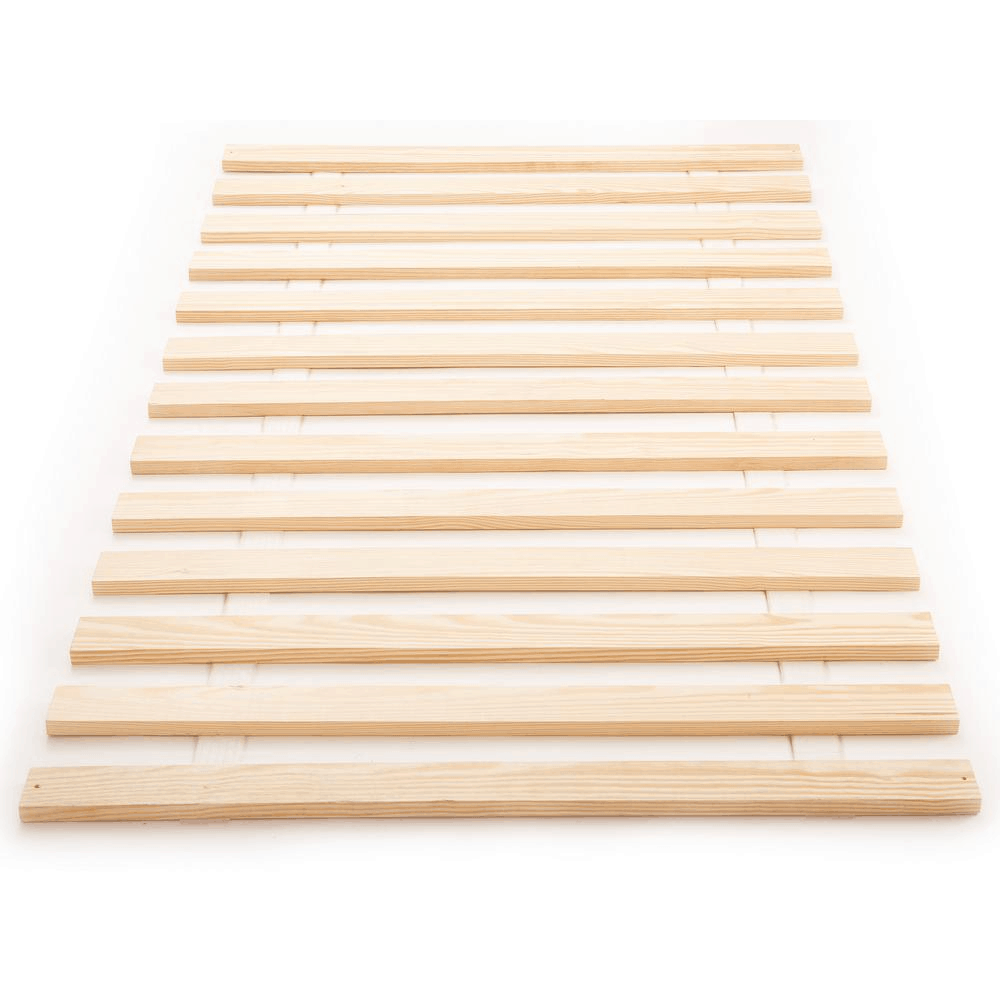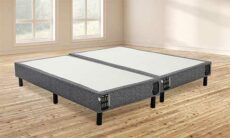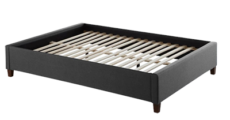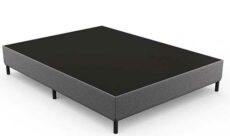When you buy a new mattress, the next step is to think about the kind of mattress foundation it will need. There are four common types of mattress foundations: box springs, slats, bunkie boards, and platform beds. A high-quality mattress foundation can extend the life of a mattress, and it may also be a requirement for certain mattress warranty claims. The quality and type of your mattress foundation can affect whether you get a good night’s sleep or not; therefore, it is essential that you know the pros and cons of the different types of mattress foundations as well as the thickness and size of each foundation. But what is the thickness and size of each type of mattress foundation?
Mattress foundations range from less than 1 inch to 18 inches thick. Box springs are typically 8 to 10 inches thick, bunkie boards are typically 1.5 to 3 inches thick, slats are usually ¾ of an inch to 2 inches thick, and platform beds range from 14 to 18 inches thick. Mattress foundation sizes depend on which size bed they are designed to be used with: twin mattress foundations are typically 38 inches by 74 inches, full mattress foundations are 53 inches by 74 inches, queen mattress foundations are 59.5 inches by 79 inches, and king mattress foundations are 75 inches by 79 inches.
3 great foundations we tested and we recommend
Below, we’ll go into more detail about each type of mattress foundation.
What Is a Mattress Foundation?
A mattress foundation is placed under a mattress to provide even support, prevent the mattress from sagging, and protect the mattress from wear. Mattress foundations typically sit on top of a bed frame, but some bed frames have a mattress foundation built in.
There are many different types of mattress foundations, including box springs, slats, bunkie boards, and platform beds. In some cases, like platform beds, the mattress foundation is part of the bed frame due to its construction. Many bed frames also have slats built in. The type of foundation you need for your bed has a lot to do with the type of mattress you have and what kind of support it needs.
Wondering if you need a mattress foundation or a bed frame? We’ve analyzed that!
Types of Mattress Foundations and Which Mattresses They Are Ideal For
There are several kinds of mattress foundations to choose from, but the most common types are box springs, slats, bunkie boards, and platform beds. It is important to note that not every kind of foundation works with every kind of mattress; for example, box springs only work well with innerspring mattresses.
Box springs are usually made of a frame covered in cloth and are ideal for innerspring mattresses. Slats are made of wood or metal and are ideal for memory foam and latex foam mattresses as well as Japanese futons. Bunkie boards are made of flat platforms like plywood and are ideal for western futon mattresses and memory foam, hybrid, and latex mattresses. Platform beds are bed frames that have a platform that serves as a mattress support, and as a result they are ideal for all types of mattresses.
Box Springs
Box springs are usually made of wood and springs that are arranged together in a grid pattern and covered with cloth. Box springs are typically placed on a wooden or metal bed frame, and the springs provide a little bounce to the mattress on top. The term “box spring” is sometimes used to describe other kinds of mattress foundations; however, a true box spring will contain springs and work well with innerspring mattresses.
Here are our favorite box springs. Box springs are also easy to dress up, take a look at our guide to bed skirt styles and 10 interesting ideas for more information.
Make sure to check out our related article, does a sleigh bed need a box spring for our thoughts on those types of beds.
Slats
Slats are a less expensive type of foundation than box springs, and individual slats can be easily replaced if one breaks. Slats are also easier to move around, can be made to fit any bed size, and also increase airflow to make the mattress feel more comfortable. For more information about body temperature and airflow and how they affect sleep, see this study. Slats come in both wooden and metal varieties, but wooden slats are cheaper and may last longer as well.
Slats work best with Japanese futon mattresses as well as memory foam and latex foam mattresses. Slats can either be narrowly spaced or widely spaced in a grid pattern; however, it is typically better for them to be narrowly spaced so that the mattress doesn’t sag into the spaces between the slats. If the slats are too widely spaced and the mattress starts to sag, it can cause discomfort and back problems. For more information about how sleep surfaces and support affect back pain and sleep quality, see this study.
To support a memory foam mattress, you should get slats that are at most 3 inches apart like these ones. This prevents sagging and helps increase the life of the mattress.
In case you’re still wondering if you need a mattress foundation, read our article!
Bunkie Boards
Bunkie boards are flat boards made of wood, plywood, or particleboard, and they are intended to rest between the mattress and the surface that the mattress is resting on. Bunkie boards can be used with slats and other types of mattress foundations, or they can be placed directly on the bed frame. Bunkie boards are typically 1 to 3 inches tall, so they work best with western-style futons and memory foam mattresses since they add just the right amount of height and also allow for air circulation. They also work well with hybrid and latex mattresses.
Since bunkie boards are often made from wood or plywood, the material is very light and easy to handle. Bunkie boards are also easy to clean and dismantle, and they are one of the most durable types of mattress foundations.
Here are our recommended bunkie boards.
Platform Beds
A platform bed is a basic bed frame that usually has a solid piece of wood or other material that the mattress can be placed on top of for support. However, some platform beds come with wooden slats or a metal grid surface that acts as a support for the mattress and allows air to flow freely beneath the mattress. Platform beds work well with all kinds of mattresses because their height allows for good air circulation and lots of steady support.
Platform beds are easy to find and are also very easy to dismantle. As we mentioned before, platform beds are usually made of wood, but they can also be made of metal or other materials. When buying a platform bed, it is important to consider the stability of the frame because the sturdier the frame is, the longer it will last. Wondering why platform beds are good and their pros/cons?
For a summary of the different types of mattress foundations and the mattresses they work best with, see the table below.
Related articles:
Mattress Foundation Thickness Guide
Mattress foundation thickness ranges from less than an inch to 18 inches thick. Box springs are typically 8 to 10 inches thick, bunkie boards are typically 1.5 to 3 inches thick, slats are usually ¾ of an inch to 2 inches thick, and platform beds range from 14 to 18 inches thick.
Some mattress foundations, such as platform beds, are very thick. However, some mattress foundations, like slats, are usually quite thin. Depending on which type of mattress you have and how high you want your bed to be, you may want to choose a thicker foundation to raise it, or you may want to choose a thinner foundation to make it lower.
Below, we’ve included a summary of the thickness of each type of mattress foundation, as well as an example of a foundation that matches this thickness.
| Type of Mattress Foundation | Height or Thickness | Example Product Name and Link to Amazon | Price |
| Box spring | 8-10 inches thick | 9″ Premium Foldable Mattress Foundation/Box Spring with Steel Slats and Wood Legs | ~$175 |
| Slats | 0.75-2 inches | 0.75″ Solid Wood Vertical Bed Support Slats / Bunkie Board, Twin | ~40 |
| Bunkie board | 1.5-3 inches | Continental Mattress 1.5” Standard Mattress Support Wooden Bunkie Board/Slats, Twin | ~$45 |
| Platform bed | 14-18 inches thick | Zinus Shawn 14” Metal Smart Base Bed Frame / Platform Bed Frame | ~$90 |
How Thick a Mattress Foundation Should I Get?
The thickness of a mattress foundation determines how hard it is to move around, how heavy it is, its weight capacity, and the height of your mattress.
Choose a mattress foundation that is thick enough to raise your mattress to a desirable height and has a high enough weight capacity for your mattress and your sleepers.
Mobility
If you plan to move your mattress, bed frame, and mattress foundation a lot, you should get a mattress foundation that’s light enough to move around but still thick enough to bear your weight and the weight of the mattress along with bedding.
Weight Capacity and Weight
Your mattress foundation’s thickness will affect how heavy it is. Thicker mattress foundations tend to be heavier than thinner mattress foundations. The thickness also affects the weight capacity. Here’s our article on how to choose bunkie board thickness and weight capacity. It’s important to note that the weight capacity of the mattress foundation and the weight capacity of the bed frame are important. If one is lower than the other, then you can run into trouble.
Height
How tall do you want your mattress to be? Someone really tall would want a taller bed so they can get in and out easily. Additionally, someone who wants their bed to look more prominent in the bedroom will want a taller bed. For these sleepers, we recommend getting a thicker mattress foundation or to layer a foundation on top of a tall bed frame. You could also, alternatively, raise your bed with bed risers.
On the other hand, some sleepers prefer to sleep on the floor or on minimalist beds. They tend to want minimalist mattress foundations as well like tatami mats or bunkie boards. We discuss box springs and alternatives (including sleeping on the floor) in our article.
Mattress Foundation Size Guide
Mattress foundation sizes are the same as standard bed frame sizes. Twin mattress foundations are typically 38 inches by 74 inches, full mattress foundations are 53 inches by 74 inches, queen mattress foundations are 59.5 inches by 79 inches, and king mattress foundations are 75 inches by 79 inches.
In general, mattress foundations are slightly smaller than the dimensions of the bed frame that they are designed to be used with. For example, queen size beds typically measure 60 inches by 80 inches, so queen size mattress foundations are usually 59.5 inches by 79 inches. The reason for this is to make sure that the mattress foundation fits properly into the bed frame, especially because bed frames often have a border that the foundation is placed into.
The size of your mattress foundation is important to consider because it can be the difference between a night filled with tossing and turning and a peaceful night’s sleep. For example, buying a mattress foundation that’s too small for your bed will leave parts of your mattress unsupported and may make your mattress uneven. You could even fall out of bed!
Your mattress foundation should always correspond to the size of your mattress and bed frame in order to ensure comfort and even support. As an example, a queen size mattress would require a queen size mattress foundation, whereas a twin size bed would require a twin size mattress foundation. The prices of mattress foundations tend to correspond to their size, so larger mattress foundations, like those for king size beds, are likely to be more expensive than foundations for twin size beds.
To help you choose the right size mattress foundation, we’ve made a detailed list of the sizes of each type of mattress foundation and included a link to a product from Amazon that fits those dimensions.
| Mattress Foundation Size | Dimensions (Length and Width) | Example Product Name and Link to Amazon | Price |
| Twin | 38” by 74“ | Spring Solution 0.75-Inch Standard-Mattress Support Wooden Bunkie Board/Slats, Twin | ~$40 |
| Full | 53” by 74” | AmazonBasics Premium Foldable Mattress Foundation/Box Spring with Steel Slats and Wood Legs, Full | ~$180 |
| Queen | 59.5” by 79” | AmazonBasics Premium Foldable Mattress Foundation/Box Spring with Steel Slats and Wood Legs, Queen | ~$175 |
| King | 75” by 79” | AmazonBasics Premium Foldable Mattress Foundation/Box Spring with Steel Slats and Wood Legs, King | ~$220 |




